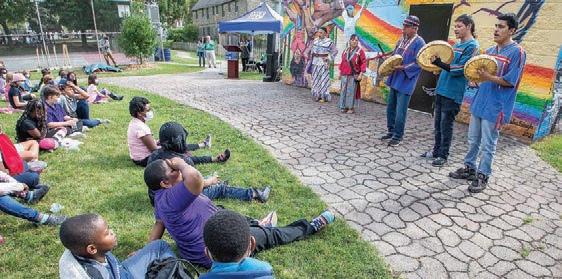
4 minute read
In the Community
GROWING TOGETHER
Peace tree takes root
Advertisement
MSOE’s University Scholars Honors Program partnered with Menominee Tribal Enterprises (MTE) and Milwaukee Recreation to plant a 10-foot white pine and unveil a community mural by Rozalia Singh at Pulaski Playfield on Milwaukee’s east side. This initiative is the result of a year-long multifaceted project of MSOE students working with MTE to promote social unity, environmental consciousness and youth empowerment.

The celebratory event included a performance by the Wolf River Group tribal drum team.
The tree planting and mural unveiling occurred at a celebratory event on Oct. 8. The event featured performances by the Wolf River Group tribal drum team, remarks by elected officials and local dignitaries, a prayer and blessing of the tree, and unveiling of the mural entitled “Growing Together.”
Milwaukee’s peace tree was first of many that were planted in neighboring cities (Appleton, Kenosha and Chicago), kicking o a week of community gatherings around Indigenous Peoples’ Day. White pines are an Iroquois symbol of Great Peace, of a new unity together, changing and growing as a nation. The trees came from the Menominee Forest in northeast Wisconsin, which has been sustainably managed by the Menominee Tribe for more than 150 years and is a premier example of forest management in the world.
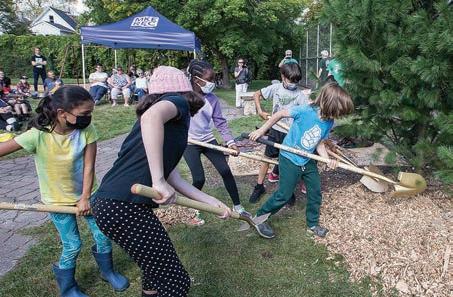
Students from local elementary schools helped plant the white pine tree in Pulaski Playfield.
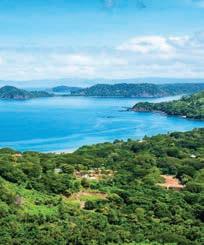
Water stewards
Civil engineering students at MSOE designed an award-winning wastewater treatment system for the Samara District, which is located on the Pacific coast of Costa Rica. It includes a growing population of 6,000 and welcomes 120,000 tourists per year.
Currently, septic tanks are used to treat wastewater, but they are malfunctioning and becoming a public health hazard. Through the Global Water Stewardship/Central States Water Environment Association (GWS/CSWEA) Student Design Competition, Alexis Countryman, Grace Cushing, Brigid Doyle, Brandon Garrido, Mercedes Lentz, Sydney Shaffer, Molly Stewart, Yilda Torres and Monica Vincent designed an alternate eco-friendly, centralized and sustainable treatment system.
The system can accommodate high flow variability, heavy rainfall, future flexibility, and simple operation and maintenance. Finally, the team ensured it would preserve the coral reef o the coast, drinking water sources and natural beauty of the area.
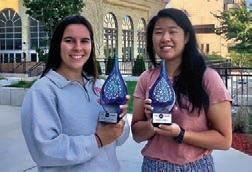
Enhanced sanitation in the Navajo Nation
The International Water, Sanitation and Hygiene (IWSH) Foundation awarded MSOE architectural engineering students Sarah Ceurvorst and Katie Ashley with the 2021 IWSH Award for their work developing the design of handwashing stations for the Navajo Nation.
The freestanding handwashing units hold a 200-gallon tank of water which serves a six-person household in the Navajo Nation for one month. Ceurvorst and Ashley worked with IWSH and the DigDeep Navajo Water Project to head the redesign of handwashing stations under the leadership of Doug Nelson, associate professor in the Civil and Architectural Engineering and Construction Management Department.
SUSTAINABLE SPICE
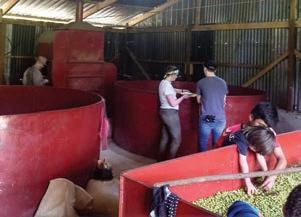
Engineers Without Borders members examine the spice dryers in Guatemala.
Engineers Without Borders awarded $25,000 grand prize awarded $25,000 grand prize
Sustainable spice—no, it’s not the sixth Spice Girl, it’s the work of MSOE’s chapter of Engineers Without Borders (EWB). Their project, “Sustainable Improvements for Guatemalan Cardamom Spice Dryers,” was awarded the 2021 National Council of Examiners for Engineering and Surveying (NCEES) Engineering Education Award and $25,000 grand prize to support future chapter projects.
Through the MSOE chapter of EWB-USA, students developed a solution to improve the fuel efficiency of cardamom spice dryers in Guatemala. A Guatemalan agricultural NGO (Heifer International) had initially planned to replace all 6,000 of the traditional inefficient dryers in Guatemala with efficient modern machinery. The magnitude of this task motivated them to concurrently consider small-scale, low-cost improvements to existing dryers. They approached EWB-USA and provided a clear destination— improved efficiency—but no road map.
The EWB project was completed by a team of primarily mechanical engineering students from MSOE who collaborated with professional engineers and other professionals to develop a low-cost metal attachment called a swirler, which is inserted into heat exchanger tubes in spice dryers. The swirler, at a one-time cost of two dollars, is made from sheet metal and a pair of tin snips and pliers. The solution will reduce deforestation and improve the overall quality of life in rural Guatemalan communities. The NCEES jury praised the project for providing an ingenious solution to an environmental issue.
Experiential learning helps students develop MSOE Mindset
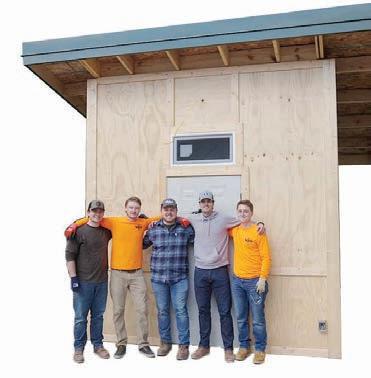
The Blue Lotus Farm and Retreat Center near West Bend, Wisconsin has a new bath house complete with a hydraulic-assisted lift table, wash station and changing area thanks to the work of 2021 construction management graduates Ethan Buechel, Willem Gauthier, Maxwell Jenney, Jeff Makowski and Justin Meseberg who took on the bath house as their senior design project. Blue Lotus serves those with profound life challenges of any age by providing accessible outdoor recreational and therapeutic opportunities in a caring, accepting and inspiring 64-acre day camp setting.
WATCH THE BATH HOUSE TAKE SHAPE AND LEARN MORE ABOUT MSOE’S PARTNERSHIP WITH BLUE LOTUS AT MSOE.EDU/DIMENSIONS.









